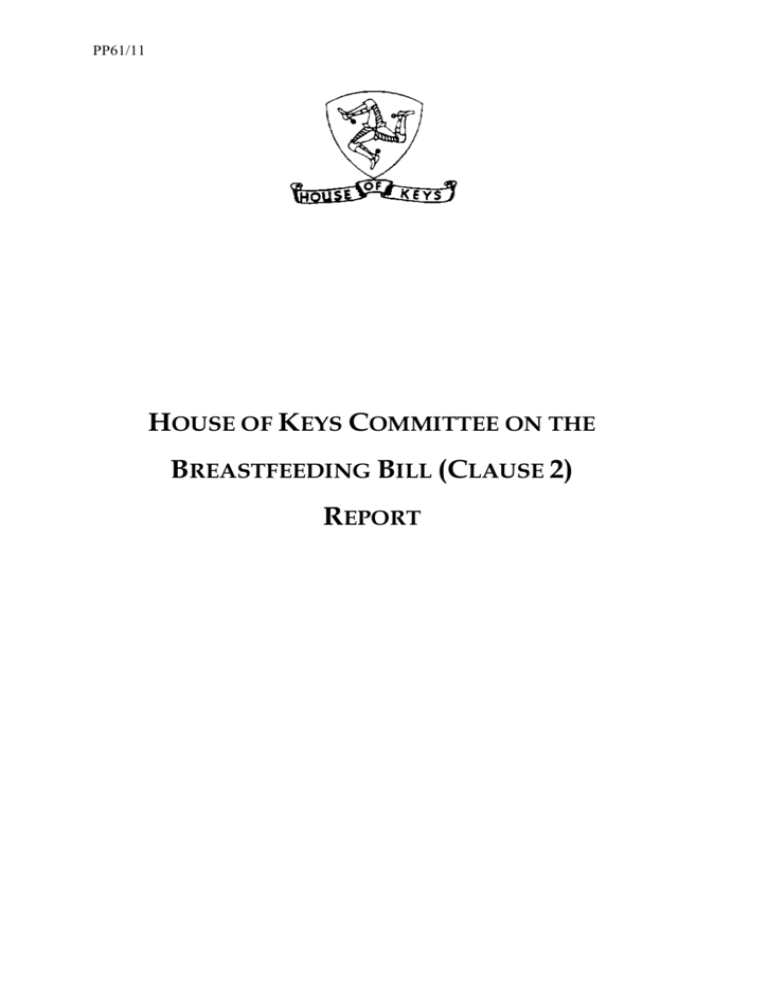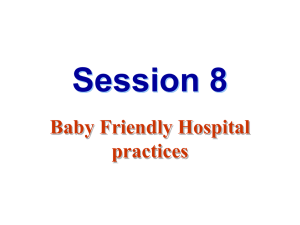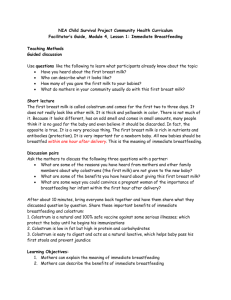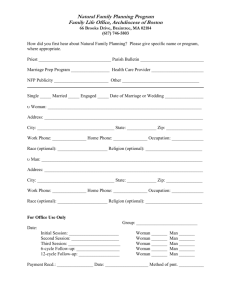draft Report (final)
advertisement

PP61/11 HOUSE OF KEYS COMMITTEE ON THE BREASTFEEDING BILL (CLAUSE 2) REPORT HOUSE OF KEYS COMMITTEE ON THE BREASTFEEDING BILL (CLAUSE 2) REPORT OF THE COMMITTEE ELECTED BY THE HOUSE ON 8th FEBRUARY 2011 Mr C Robertshaw MHK (Douglas East) (Caairliagh) Mrs B J Cannell MHK (Douglas East) Mr Q GILL MHK (Rushen) The remit of the Committee was to: “To consider Clause 2 of the Breastfeeding Bill and report”. 1 TO: The Speaker and Members of the House of Keys Introduction 1. The Breastfeeding Bill1 is a Private Member’s Bill, introduced by Mr Juan Watterson MHK. The House gave leave to introduce the Bill on 26th October 2010. It received its First Reading on 21st December 2010 and its Second Reading in the House (on a division) on 25th January 2011. On 8th February, before consideration of clauses was embarked on, Clause 2 of the Bill was referred to a Committee of three members for consideration and report. The House postponed consideration of the remaining clauses. In debate, Members expressed concern about the use of the criminal law to enforce a right to breastfeed by way of prosecution of the proprietors of premises open to the public. Mr Robertshaw, Mrs Cannell and Mr Gill were elected to the Committee. 2. The Committee met briefly on 15th February and elected Mr Robertshaw Caairliagh of the Committee. On 22nd February the Committee met and agreed to compare the legislation covering the right to breastfeed in a public place in the British Isles. The principle of breastfeeding 3. The WHO Global Strategy on Infant and Young Child Feeding (2003) states: "As a global public health recommendation, infants should be exclusively breastfed for the first six months of life to achieve optimal growth, development and health. Thereafter, to meet their evolving nutritional requirements, infants should receive nutritionally adequate and safe complementary foods while breastfeeding continues for up to two years of age or beyond."2 1 2 see Appendix 1 http://whqlibdoc.who.int/publications/2003/9241562218.pdf 2 4. The Committee unanimously supports the principle that mothers should have a legal right to breastfeed their babies in a public place. It recognises the importance of this right which underlines the significant benefits to babies of breastfeeding, especially in their early months. The law elsewhere 5. In the Isle of Man, although it is not illegal to breastfeed in public it is also not illegal for those operating public places such as restaurants or public transport to ask breastfeeding mothers to stop feeding or to leave the premises. The law now differs on this subject in England and Wales, Scotland, Northern Ireland, the Republic of Ireland and the Isle of Man. The text of the Breastfeeding Bill 2010, which is before the House, is largely based on the Breastfeeding etc (Scotland) Act 2005. Scotland 6. In 2005 the Breastfeeding etc (Scotland) Act 2005 made it a criminal offence in Scotland to ban breastfeeding in cafes, restaurants and pubs, shops and on public transport.3 For the purposes of the Act a child is defined as being a person who has not yet attained the age of two years. It is an offence to prevent a person in charge of a child from feeding milk to that child in a public place or on licensed premises, punishable by a fine not exceeding level 4 on the standard scale (currently £2,500). England & Wales 7. In England and Wales a different approach has been adopted: the Equality Act 2010 prohibits discrimination against a woman because she is breastfeeding. The Act makes clear that mothers can breastfeed their children in places like 3 http://www.legislation.gov.uk/asp/2005/1 3 cafes and shops and not be asked to leave, by prohibiting discrimination. However, this is limited to the period from birth to the end of 26 weeks. 4 These sections apply to England, Wales and Scotland.5 Section 13(6) of the Act refers specifically to breastfeeding: “If the protected characteristic is sex— (a)less favourable treatment of a woman includes less favourable treatment of her because she is breast-feeding;” Section 17(4) of the Act lays down that: “The reference in subsection (3) to treating a woman unfavourably because she has given birth includes, in particular, a reference to treating her unfavourably because she is breast-feeding.” The remedy for discrimination under the Act is a civil claim in the local County Court (or in Scotland the Sheriff Court). Northern Ireland 8. Since 2004, the Health Promotion Agency for Northern Ireland has encouraged the general public to be supportive of mothers breastfeeding in public places, but this is not covered by legislation. The focus there is on the health aspects of breastfeeding and trying to encourage more new mothers to breast feed. Northern Ireland launched a review of the breastfeeding strategy in June 2010. The Public Health Agency is also working to improve attitudes to breastfeeding in public through the “Breastfeeding Welcome Here” scheme which has over 200 businesses and public facilities signed up to support and welcome breastfeeding families. 4 5 See section 17(3) and 17(4). http://www.legislation.gov.uk/ukpga/2010/15 4 Ireland 9. Republic of Ireland law protects the rights of breastfeeding mothers in public spaces and at their workplace. There are two pieces of legislation that protect breastfeeding mothers from discrimination or harassment while breastfeeding: The Equal Status Act 20006; and The Intoxicating Liquor Act 20037. The Equal Status Act 2000 protects people from discrimination and harassment (including sexual harassment) in the use of and access to a wide range of services including shops and restaurants. Protection for those breastfeeding in public is provided under two of the nine discriminatory grounds covered by the Act, Gender and Family Status, although breastfeeding is not mentioned specifically. The Intoxicating Liquor Act 2003, section 19 protects against discrimination occurring in a public house and provides access to the District Court for redress. The Committee’s conclusions 10. The Committee met on 9th March and discussed the scope of Clause 2 and the problems which it was designed to address. There was general agreement in the Committee that the civil rather than the criminal law might provide a better route to solve the problems experienced by breastfeeding mothers, as long as the law established an enforceable right to which mothers could appeal to enable them to defend their interests. (This right should, of course, extend to bottle feeding mothers – the essential right is to be able to choose to feed a baby on demand in a public place). It was noted in particular that often the problem arose not from proprietors who may be absent or totally unaware of the circumstances or even staff, but other people on the premises who are not caught by the provisions of Clause 2 as they stand. 6 7 http://www.irishstatutebook.ie/2000/en/act/pub/0008/index.html http://www.irishstatutebook.ie/2003/en/act/pub/0031/index.html 5 11. Despite the general agreement in the Committee, there were two unresolved issues: How old should a baby be for the right to continue? Clearly, a three month old baby must be able to be breastfed, but there should be a maximum age of child in respect of which the right exists. As we have indicated, the law in England establishes a right to breastfeed up to 26 weeks, but Scottish law provides a right up to when the child is two years of age. In practice, how would the right be enforceable? The Committee was keen for a mother who is challenged (as noted above, not necessarily by the proprietors of establishments or even by misguided staff, but often by other customers) to be able to assert her right easily and to find simple and effective redress if she is not allowed to feed her baby according to her legal right. 12. The Committee therefore agreed: To seek advice from the Department of Health about the proper age at which the right was no longer appropriate, whether twelve months or another age; To ask the Bill drafter for a replacement Clause 2 which would set out a right for mothers to breastfeed in public babies up to a particular age, which would be enforceable in the small claims court. No decision was made about whether to indicate a maximum level of damages available or, if so, what the maximum should be; and To invite the Bill Proposer (Mr Watterson) to the next meeting to discuss the proposed New Clause 2. 6 Up to what age of baby? 13. Dr Paul Emerson FFPH, Consultant in Public Health Medicine, Department of Health, Public Health Directorate, replied on behalf of the Minister. His advice echoed the WHO opinion, as follows: “The WHO recommends that breastfeeding carries on exclusively for the first 6 months of life and then weaning commences with continuation of breastfeeding up to 2 years of age. The EU and UK follow this guidance and we in PH recommend the same. So the Bill should support the right to breastfeed infants up to age of 2 years in places where mums and infants are allowed access. This is what Scotland recently legislated for and New Zealand recommends this too. Many of the over 40 USA states that promote breastfeeding through PH legislation do not specify any age because they recognise that some families choose to breastfeed their kids way beyond 2 years – but this is where the legislation is more within the human rights or civil liberties sphere. For optimal health babies and infants would receive breast milk for the first 2 years of life and this is what should be referred to in local legislation in our view”. 14. Since we are recommending that a legal right be created it is necessary to define it. There was discussion in the Committee as to the precise age of baby up to which a mother should as a right breastfeed: whether the two year limit recommended by the WHO is appropriate on which to base the legal right; or whether the right should be limited to twelve months (already a significant increase on the 26 week limit in the Equality Act2010 (Act of Parliament)). We all support creating a legally enforceable right to feed a baby in a public place at least up to when the baby is twelve months old, since a baby up to then is usually dependent on its mother or bottle feeding for sustenance. After that time, when a baby has started to be weaned, the case for the right is less clear cut. We note the recommendation of the WHO referred to by Dr Emerson, but we also note that the law provides different levels of protection in the various jurisdictions in the British Isles. 7 A civil remedy 15. There was some concern in the House about creating a criminal sanction to protect breastfeeding mothers. One issue was whether the situation demanded protection of the criminal law in principle. Another point of concern was the potential criminalisation of a proprietor who may not have been on the premises at the time or be, in any ordinary sense, culpable. Often, it is not proprietors of premises who oppose breastfeeding but other customers who are in public premises. Under the Bill as originally drafted people other than proprietors of premises would escape all sanction. We prefer to focus the remedy on establishing a legal right, which is enforceable against anyone who interferes with the right – not just proprietors of premises. 16. We asked the Bill drafter for an alternative draft to Clause 2, establishing a legal right which was enforceable in the civil courts against anyone, as follows (deleted passages are scored through and added passages are underlined): 2. (1) It is an offence to deliberately prevent a person in charge of a baby from feeding milk to the baby in a public place or on licensed premises in the manner chosen by the person in charge of the baby. (1) A person in charge of a baby may feed milk to the baby in a public place or on licensed premises. (2) Subsection (1) does not apply if the baby, at the material time, is not lawfully permitted to be in the public place or on the licensed premises. (3) However, it is an offence to a person must not deliberately prevent a person in charge of a baby from being in a public place or on licensed premises on the ground that the person in charge of the baby is to, or may, feed milk to the baby whilst in the place or on the premises. (4) A person guilty of an offence under subsection (1) or (3) is liable on summary conviction to a fine not exceeding £2,500. 8 (4) Subject to subsection (2), a person who is deliberately prevented by another person from – (a) feeding milk to a baby in accordance with subsection (1); or (b) being in a public place or on licensed premises on the ground specified in subsection (3), may claim damages against the other person for injury to feelings. (5) Subject to subsection (6), the sum awarded as damages under this section is not to exceed £2,500. (6) The Treasury may by order amend subsection (5) by varying the sum specified in it. (7) An order under subsection (6) may not come into operation unless it is approved by Tynwald. (8) In this section — “baby” means a person who has not yet attained the age of 1 year; “feeding” includes — (a) breastfeeding; and (b) feeding from a bottle or other container; “licensed premises” means premises licensed under — (a) the Music and Dancing Act 1961; or (b) the Licensing Act 1995; “milk” includes breastmilk, cow’s milk, goat’s milk, soya milk and infant formula; “public place” means any place to which, at the material time, the public or any section of the public has access, on payment or otherwise, as of right or by virtue of express or implied permission. (9) This section does not limit the operation of section 35 of the Licensing Act 1995 (expulsion of persons from licensed premises). On page 1, for the marginal note to clause 2 substitute “Right to feed milk to a baby”. 9 As consequential amendments, Clause 3 (1)8, 3 (4)9 and all of Clause 4 (Offences of bodies corporate or partnerships) would be omitted. 17. We propose that this set of amendments be agreed by the House. Our intention is that any claim under the Act is to be covered by the small claims procedure. Small claims arbitration is covered by Rules of Court.10 Cases where the claim does not exceed £10,000 are generally allocated for the small claims procedure. We are confident that this amendment will create a right to breastfeed which will protect mothers and be easily enforceable in a Small Claims Court. We note that access to the Small Claims Court is easy and inexpensive. Recommendation 18. That Clause 2 be amended as set out in paragraph 16 of this Report, to create a mother’s right to feed her baby in a public place, which is enforceable in civil law against anyone. C Robertshaw (Chairman) B J Cannell Q Gill 23rd March 2011 3 (1): “This section applies if proceedings are brought under this Act.” 3 (4): “If the proceedings are brought against an employer in respect of an offence alleged to have been committed by an employee of the employer, it is a defence for the employer to prove that the employer took such steps as were reasonably practicable to prevent the employee from committing the offence in the course of the employee’s employment.” 10 see section 16 of the High Court Act 1991 and Parts 5, 10 and 11 of the Rules of the High Court of Justice 2009. 8 9 10



